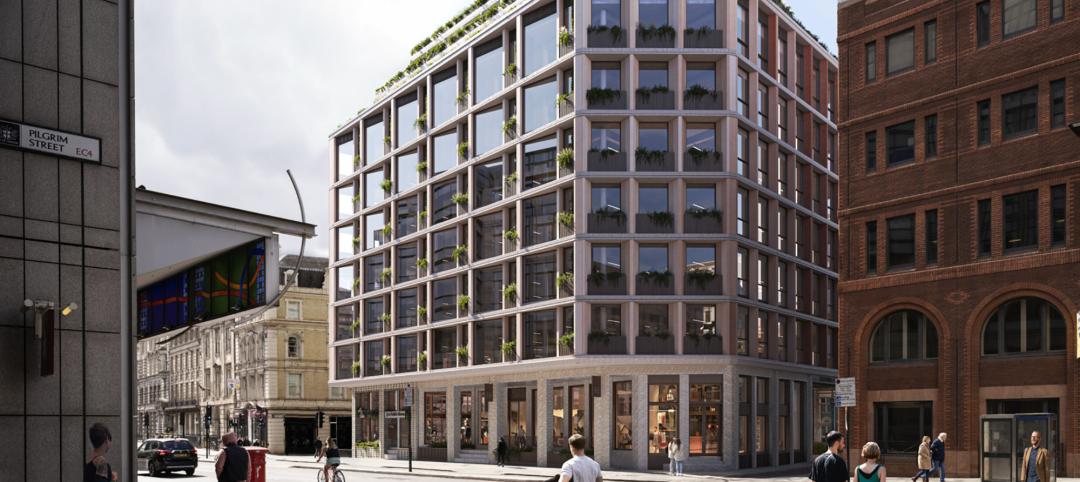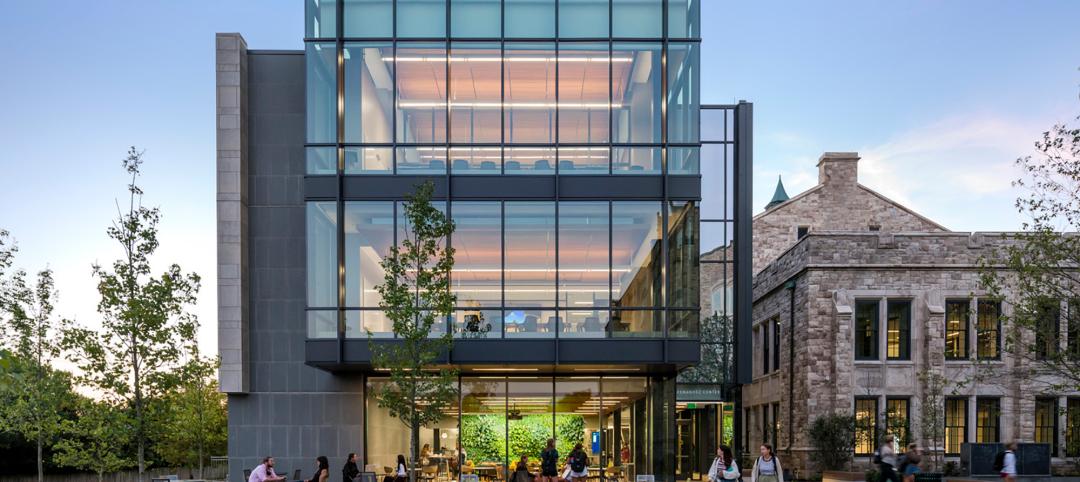In a new brief released on Sept. 29, the U.S. Green Building Council (USGBC) and Green Business Certification Inc. (GBCI) outline an expanded suite of programs and resources focused on improving building and community resilience in the face of climate risks. While governments and businesses focus on economic recovery, more frequent and severe climate events threaten to interrupt progress. Green building helps companies and communities adapt to and mitigate the effects of these growing climate concerns.
“Green buildings are the first step to creating more resilient businesses and communities while also supporting economic development and growth,” said Mahesh Ramanujam, president and CEO of USGBC and GBCI. “We know people, especially those in our most vulnerable communities, are already experiencing the costs of a changing climate and the resilience of the people in these structures is a critical factor. Resilient design, construction and operations verified through green building and infrastructure certifications can help reduce risk and vulnerability. USGBC and GBCI’s resources serve as a roadmap for resilience that has the ability to save companies money and improve the standard of living for all.”
The building and construction industry must accelerate its adoption of strategies and practices that respond to climate threats communities are currently facing. The new brief outlines USGBC and GBCI’s existing resilience resources along with new opportunities and include:
— LEED: The most widely used green building rating system offers a series of resilience design pilot credits that ensure project teams are aware of and are addressing vulnerabilities. The credits are available for new construction and align with the RELi Rating System. Currently, more than 200 projects have registered to pursue the credits. The LEED for Cities and Communities program outlines options to enhance resilience beyond a single building. More than 110 cities and communities have certified.
— Certification Systems: GBCI integrates resilience strategies across several rating systems. RELi takes a holistic approach to resilience and helps developers, companies, city planners and others assess and plan for acute hazards. LEED credits can also count toward RELi certification. PEER serves as a roadmap for designing and operating resilient and reliable power systems and microgrids and has more than 30 certified projects that serve more than seven million people. SITES focuses on creating regenerative landscapes and ecologically resilient communities and has nearly 150 projects participating.
— Data & Technology: Data will define the future of green building, which is why USGBC is working with Coastal Risk Consulting to deliver a RiskFootprint™ for buildings, communities and cities that provides a climate risk analysis. The service will integrate with LEED, Arc and GBCI rating systems to help assess a project’s vulnerability.
— Workforce Education: Equipping professionals with the latest skills and knowledge is critical to scaling resilient practices and Education @USGBC offers courses from experts working on resilience. USGBC will also open a call for ideas on enhancing resilience across the green building industry. GBCI is also developing a new RELi professional credential expected to be ready in 2021.
— Advocacy: USGBC works with federal, state and local governments and jurisdictions to advocate for policies, guidance and incentives that support green buildings and communities. A goal of that work is to ensure disaster recovery funds are spent on high quality, resilient buildings that mitigate climate risks and promote social equity and health. The latest advocacy activities are housed in the USGBC Center for Resilience.
— Partnerships: USGBC will leverage its network of members, partners and LEED users to build a community of leaders for resilient buildings, communities and cities. USGBC will establish partnerships with a variety of organizations committed to advancing resilience.
The resilience offerings are part of USGBC’s reimagined vision and economic recovery strategy, Healthy People in Healthy Places Equals a Healthy Economy. Resilience is a critical component of building a healthier, more sustainable future, but can also influence how companies and governments respond to social and economic disruptions. Resilience planning helps future proofs assets and support communities in times of crisis.
Over the last two years, reportedly more than 16 million people globally, including an estimated 1.2 million Americans, were displaced because of climate events. A number that is expected to continue to grow impacting livability and workability. In a 2019 report from CDP, a group of the world’s largest companies valued climate risks to their businesses at almost $1 trillion – with many likely to occur within the next five years. It reinforces the need for immediate solutions that can help mitigate social and economic costs that are predicted in the near term. Green building programs like LEED, RELi and other GBCI rating systems outline for business leaders and government officials necessary actions and provide a framework for communicating progress.
To learn more about resilience in the building industry, USGBC’s annual Resilience Summit will be held at Greenbuild 2020 on Oct. 1, featuring resilience leaders and the opportunity to learn the newest research and technology around resilience-enhancing designs, technologies, materials and methods. Registration for the Summit and Greenbuild virtual events is open.
Related Stories
Resiliency | Jul 27, 2023
'Underground climate change' can damage building foundations, civil infrastructure
A phenomenon known as “underground climate change” can lead to damage of building foundations and civil infrastructure, according to a researcher at Northwestern University. When the ground gets hotter, it can expand and contract, causing foundations to move and sometimes crack.
Sustainability | Jul 26, 2023
Carbon Neutrality at HKS, with Rand Ekman, Chief Sustainability Officer
Rand Ekman, Chief Sustainability Officer at HKS Inc., discusses the firm's decarbonization strategy and carbon footprint assessment.
Concrete | Jul 19, 2023
Public policy hindering widespread adoption of sustainable concrete
Researchers are making significant strides in reducing embedded carbon in concrete, but public policies have been slow to adopt this more sustainable option.
Sustainability | Jul 19, 2023
California lawmakers approve governor’s plan to accelerate green construction
California lawmakers recently approved Gov. Gavin Newsom’s infrastructure streamlining plan that aims to accelerate clean energy and infrastructure projects.
Sustainability | Jul 13, 2023
Deep green retrofits: Updating old buildings to new sustainability standards
HOK’s David Weatherhead and Atenor’s Eoin Conroy discuss the challenges and opportunities of refurbishing old buildings to meet modern-day sustainability standards.
Mass Timber | Jul 11, 2023
5 solutions to acoustic issues in mass timber buildings
For all its advantages, mass timber also has a less-heralded quality: its acoustic challenges. Exposed wood ceilings and floors have led to issues with excessive noise. Mass timber experts offer practical solutions to the top five acoustic issues in mass timber buildings.
Adaptive Reuse | Jul 6, 2023
The responsibility of adapting historic university buildings
Shepley Bulfinch's David Whitehill, AIA, believes the adaptive reuse of historic university buildings is not a matter of sentimentality but of practicality, progress, and preservation.
Contractors | Jun 30, 2023
Construction industry task force aims for standardized carbon reporting
A newly formed Associated General Contractors of America (AGC) task force on decarbonization and carbon reporting will address the challenges around reporting and reducing carbon emissions in the construction industry.
Apartments | Jun 27, 2023
Dallas high-rise multifamily tower is first in state to receive WELL Gold certification
HALL Arts Residences, 28-story luxury residential high-rise in the Dallas Arts District, recently became the first high-rise multifamily tower in Texas to receive WELL Gold Certification, a designation issued by the International WELL Building Institute. The HKS-designed condominium tower was designed with numerous wellness details.
Green | Jun 26, 2023
Federal government will spend $30 million on novel green building technologies
The U.S. General Services Administration (GSA), and the U.S. Department of Energy (DOE) will invest $30 million from the Inflation Reduction Act to increase the sustainability of federal buildings by testing novel technologies. The vehicle for that effort, the Green Proving Ground (GPG) program, will invest in American-made technologies to help increase federal electric vehicle supply equipment, protect air quality, reduce climate pollution, and enhance building performance.

















